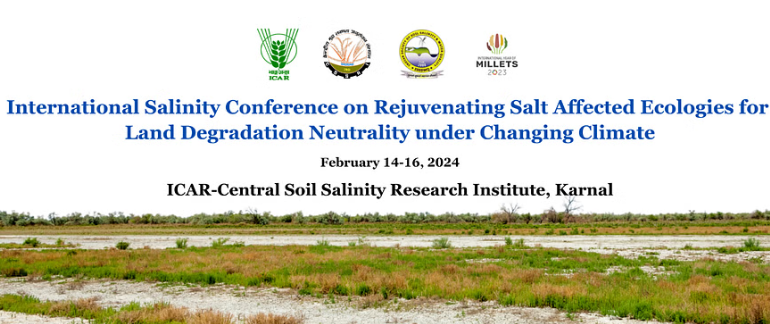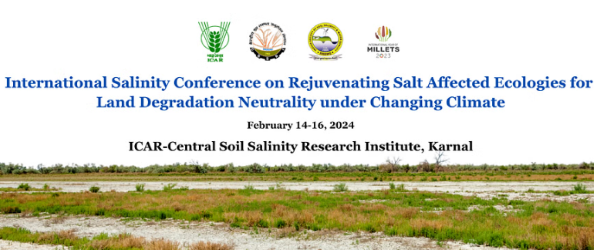Soil salinity poses a significant threat to agricultural productivity and environmental sustainability worldwide. In a bid to tackle this pressing issue, the Indian Society of Soil Salinity and Water Quality, in collaboration with ICAR-CSSRI (Central Soil Salinity Research Institute), Karnal, and the Indian Council of Agricultural Research, is organizing the International Salinity Conference on ‘Rejuvenating Salt Affected Ecologies for Land Degradation Neutrality under Changing Climate’ in Karnal, Haryana, from February 14-16, 2024.
The Global Impact of Soil Salinity
The impact of soil salinity on livelihoods and economies cannot be overstated. With approximately 835 million hectares (Mha) of salt-affected soils worldwide, of which 76 Mha is human-induced, over 2.6 billion resource-poor peasants face severe challenges. This degradation results in an annual economic loss of around US$ 6.3 billion, highlighting the urgent need for sustainable land management practices.
Soil Salinity in India
India grapples with its share of salt-affected soils, with 6.73 Mha of land currently affected. Projections indicate a potential rise to 16.2 Mha by 2050 if effective measures are not taken. Factors contributing to this issue include inefficient drainage systems, waterlogging, unsustainable practices, and the widespread use of poor-quality groundwater for irrigation.
International Efforts and India’s Commitment
Recognizing the gravity of soil salinization, the United Nations Convention to Combat Desertification (UNCCD) has laid out a strategic framework aiming for land degradation neutrality (LDN) by 2030. India has pledged to restore 26 Mha of degraded land, including salt-affected areas, aligning with these global efforts.
ICAR-CSSRI’s International Salinity Conference
The upcoming conference aims to foster discussions on innovative strategies for sustainable soil salinity management. With themes ranging from assessment and monitoring to climate-resilient practices, the conference provides a platform for researchers, policymakers, and practitioners to exchange insights and experiences.

Registration Details
- Early bird registration: February 8
- Final registration deadline: February 14, 2024
Themes of the International Salinity Conference
Theme I: Assessment, monitoring and mapping of salinity and degraded lands using advanced GIS and remote sensing tools, drivers and indicators
Theme II: Processes of salinization/land degradation and their effects on soil, water, crops, and amelioration strategies to achieve LND and SDGs.
Theme III: Efficient and sustainable strategies for productive use of groundwater and low-quality water in agriculture
Theme IV: Approaches to develop multi-stress tolerance in crops for sustainable management of saline ecologies
Theme V: Alternate land use, agro-forestry, horticultural, integrated farming systems and crop diversification for improving the productivity of degraded and saline agro-ecosystems
Theme VI: Adaptation and mitigation options and climate-resilient practices for nutrition, food and livelihood security in salt-affected ecosystems.
Theme VII: Impact of salinity/NRM technologies, socio-economic issues, policies/institutions, and crop-livestock linkages for sustainable production in salt-affected ecosystems.
Conclusion
The International Salinity Conference serves as a crucial platform for addressing the challenges posed by salt-affected soils. With a focus on collaboration, innovation, and sustainable practices, it aims to pave the way for a more resilient agricultural future.
Click Here For More Latest news and Articles
FAQs
- Why is soil salinity a significant concern? Soil salinity threatens agricultural productivity, livelihoods, and environmental sustainability, making it a pressing global issue.
- What are some causes of soil salinity in India? Causes include inefficient drainage, waterlogging, unsustainable practices, and the use of poor-quality groundwater for irrigation.
- How can individuals contribute to combating soil salinity? Individuals can promote sustainable land management practices, conserve water resources, and support initiatives aimed at soil restoration.
- What is LDN, and why is it important? LDN stands for land degradation neutrality, aiming to restore and rehabilitate degraded land, crucial for ensuring food security and ecosystem health.
- What role do conferences like the International Salinity Conference play in addressing soil salinity? Conferences provide a platform for knowledge exchange, collaboration, and the development of innovative solutions to address soil salinity challenges.
Get Access Now: https://bit.ly/J_Umma










